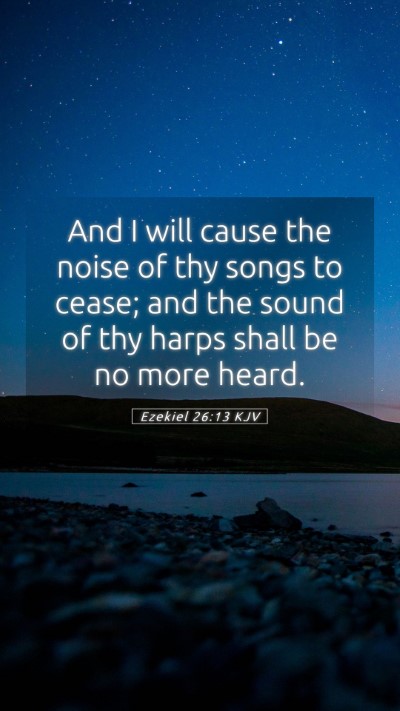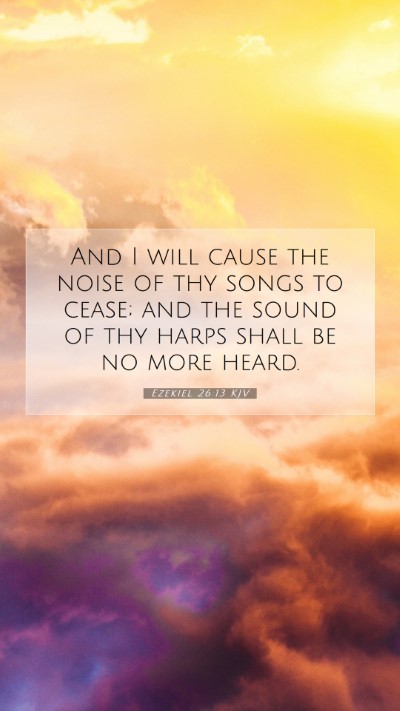Ezekiel 26:13 - Understanding the Verse
Ezekiel 26:13 states: "And I will cause the noise of thy songs to cease; and the sound of thy harp shall be no more heard."
This verse is part of a prophecy concerning the impending destruction of Tyre, a wealthy coastal city known for its commerce and trade. The prophet Ezekiel expresses God's judgment upon this city, symbolizing the loss of its former glory and vibrancy.
Bible Verse Meanings and Interpretations
The meaning of this Bible verse can be understood from several perspectives, as highlighted by prominent public domain commentaries like those of Matthew Henry, Albert Barnes, and Adam Clarke.
-
Divine Judgment: Matthew Henry emphasizes that God is exercising His sovereignty over nations. The cessation of joyful sounds represents a time of mourning and catastrophe for Tyre. It highlights the certainty of God’s judgment and the ultimate accountability of nations to divine authority.
-
Tyranny of Wealth: Albert Barnes notes that the verse reflects the dramatic shift from jubilation to desolation. The prosperity of Tyre, symbolized by its music and celebrations, will come to a halt as it faces destruction. This serves as a warning against the perils of excessive pride in material wealth.
-
Cultural Collapse: Adam Clarke suggests that the loss of music and arts illustrates the broader implications of a city’s fall. Music often symbolizes joy and life, and its cessation signifies a complete eradication of culture and vibrancy, representing a broader cultural and social decay.
Biblical Exegesis and Context
Understanding Scripture requires analyzing the historical and theological context of the verse. It is positioned within a series of prophecies where Ezekiel is addressing not only Israel but also neighboring nations.
-
Historical Context: Tyre was a powerful nation with a strong economic base, and its downfall was a significant event in the region. The prophecy indicates the inevitable downfall of even the mightiest against the will of God.
-
Theological Significance: This verse mirrors the concept of God's ultimate authority over nations. It teaches readers about the transitory nature of worldly power, wealth, and culture in light of divine plans.
Application and Relevance
The message of Ezekiel 26:13 remains relevant for contemporary readers who seek to interpret Bible verses within the context of their own lives. It prompts personal reflection on where true joy, cultural identity, and security should be rooted.
-
Application to Daily Life: Reflect on the distractions of modern life that draw focus away from spiritual growth. The verse serves as a reminder to prioritize eternal values over temporal pleasures.
-
Bible Study Insights: In Bible study groups, this verse can lead to discussions on the themes of divine justice and the nature of human achievement in light of God's plans.
-
Online Bible Study Tools: Utilizing various Bible commentary resources can deepen understanding of difficult Bible passages such as this, helping believers navigate scripture with clarity.
Related Bible Verses for Further Study
For those interested in exploring the themes of divine judgment and cultural significance to their fullest, consider these additional cross-references:
- Isaiah 23:1-18: A prophecy against Tyre that elaborates on its downfall.
- Jeremiah 25:22: Mention of the kings of Tyre and their fate.
- Ezekiel 27:32: A lament for Tyre that reflects upon its lost glory.
- Revelation 18:17-19: Symbolic references to the fall of Babylon, paralleling themes of destruction.
- Psalm 137:1: The lament of exiles and reflections on loss of culture and identity.
Conclusion
Ezekiel 26:13 encapsulates the weighty themes of divine judgment and the fleeting nature of earthly joy. This verse serves as a profound reminder of the need for believers to seek deeper spiritual meaning and values amid life's shifting circumstances. Understanding Scripture through the lenses of public domain commentaries enriches one's Bible study insights and provides clarity on complex topics. Through both individual reflection and group discussions, the insights gained can guide personal faith journeys.


